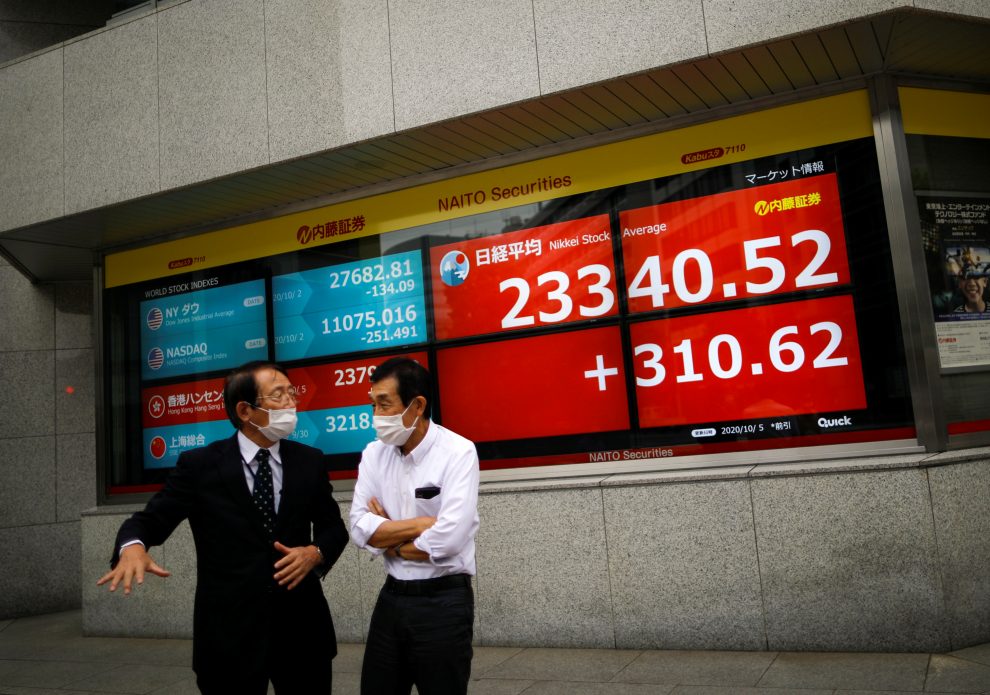Asian stocks slumped again on Friday after the fastest US inflation rate in four decades fuelled expectations of more aggressive rate hikes, while Chinese equity markets recovered their early losses after regulatory assurances over US-listed mainland firms.
Sentiment also suffered on worries over Russia’s war against Ukraine, after talks between their foreign ministers on Thursday brought little respite in the conflict between the two countries.
Russia’s war against Ukraine was likely to make everything, from energy and metals to agricultural goods, a lot more expensive, said Rob Carnell, chief economist at ING in Singapore.
“Everybody’s incomes are going to get eroded,” he said. “Global growth is going to get battered. But at the moment there’s still a bit of denial going on in markets.”
Read more: China Hopeful on Audit Deal with US After Delisting Threat Sparks Selloff
The United States, together with the Group of Seven nations and the European Union, will move on Friday to revoke Russia’s “most favoured nation” status over its invasion of Ukraine, sources claim.
Stripping Russia of its favoured nation status paves the way for the United States and its allies to impose tariffs on a wide range of Russian goods, which would further ratchet up pressure on an economy that is already heading into a “deep recession.”
By late-afternoon in Asia, MSCI’s broadest index of Asia-Pacific shares outside Japan had skidded 1.3%, after a retreat on Wall Street spilled over on many of the region’s country benchmarks.
After slumping early in the day on regulatory worries, Hong Kong’s equity market partly recovered, over reports consultations between Chinese and US regulators on audit and regulatory cooperation was moving “relatively smoothly.”
But the Hang Seng index ended down to close at its lowest level since mid-2016, falling 1.61%, or 336.47 points, at 20,553.79.
The Shanghai Composite Index added 0.41%, or 13.65 points, to 3,309.75, while the Shenzhen Composite Index on China’s second exchange gained 0.56%, or 12.20 points, to 2,173.14.
China’s blue-chip index managed to recover from early losses, closing in green territory with a 0.3% gain.
US Consumer Inflation Leaps
Elsewhere, Japan’s Nikkei fell 2.05%, or 527.62 points, to 25,162.78, while the broader Topix index gave up 1.64%, or 30.49 points, to 1,799.54 and South Korean shares shed 0.7% and Australian shares dropped 0.9%.
US consumer inflation jumped an annualised 7.9% in February, the largest increase in 40 years, data on Thursday showed. The surge implied the FOMC could move “more aggressively” to curb inflation, as promised by Fed Chair Jerome Powell last week.
Markets are already expecting the Federal Reserve to raise its Fed funds target rate by 25 basis points at the conclusion of next week’s monetary policy meeting.
In the bond market, yields on 10-year US Treasury notes were at 1.9794%, while Japan’s 10-year government bond yield was at 0.185%.
In commodity markets, US crude was up 2.2% at $108.38 a barrel. Brent crude was 2.6% higher at $112.22 per barrel.
Gold was down about 0.3%. Spot gold was traded at $1,989.68 per ounce.
Key figures around 0820 GMT
Tokyo – Nikkei 225 > DOWN 2.1 percent at 25,162. 78 (close)
Hong Kong – Hang Seng Index > DOWN 1.6 percent at 20,553.79 (close)
Shanghai – Composite > UP 0.4 percent at 3,309.75 (close)
London – FTSE 100 > UP 1.0 percent at 7,166.76
Brent North Sea crude > UP 2.1 percent at $111.61 per barrel
West Texas Intermediate > UP 1.8 percent at $107.96
New York – Dow: DOWN 0.3 percent at 33,174.07 (Thursday close)
- Reuters with additional editing by Sean O’Meara
Also on AF:
HKEX to Kick Off Derivatives Trading on Public Holidays
ByteDance’s TikTok in Deal with Oracle to Store US User Data
























